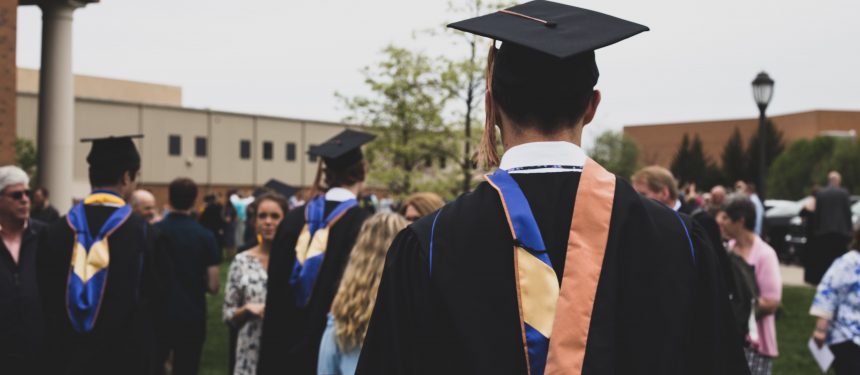Fifty-five business school deans and 15 CEOs have written an open letter to US president Donald Trump, warning him that the country does not have the high-skilled talent it needs to remain competitive in a global economy.
News and business analysis for Professionals in International Education
Have some pie!
US: Top business school deans pen letter to Trump to warn of talent ‘crisis’
 Signatories voiced their ‘urgent concern’ that the US does not have the high-skill talent it needs, nor the capacity to train enough people with the necessary skills. Photo: Unsplash
Signatories voiced their ‘urgent concern’ that the US does not have the high-skill talent it needs, nor the capacity to train enough people with the necessary skills. Photo: Unsplash
The letter was sent alongside a Graduate Management Admission Council white paper entitled ‘Early Warning Signals Winners and Losers in the Global Race for Talent’.
“Without a substantial change… this deficit of skills in key fields will hinder economic growth”
According to GMAC, the US has seen a 13.7% drop in international business school applications, a decline steeper than any other country in the world.
The decline comes during a period when there are largely rising or stable numbers elsewhere, including Canada and across Europe.
Signatories of the letter voiced their ‘urgent concern’ and said the US does not have the high-skill talent it needs, nor the capacity to train enough people with the necessary skills.
“Without a substantial change in our approach, this deficit of skills in key fields will hinder economic growth,” the letter read.
“The fact that our economy has created an estimated three million open STEM jobs is positive. It speaks to the vibrancy and opportunities available in a healthy, growing economy.
“Yet the fact that those jobs are unfilled – and that the U.S. is not producing enough people with the skills to fill them – is not just a negative, it’s a crisis,” it continued.
In GMAC’s white paper, Bill Boulding, chair of the GMAC Board and dean of Duke University’s Fuqua School of Business, warned countries of the consequences of restricting the mobility of talent.
“When brought together, the best and brightest tend to spark ideas that go well beyond borders. In many ways, mobility—specifically as talent collides—is the oxygen of innovation,” he said.
“Yet, we are now in danger of cutting off that oxygen. The rise in nationalism around the world has led to a backlash against mobility as nations turn inward and seek to keep immigrants out.
“The result could eventually suffocate economies,” he added.
Boulding explained that business schools are uniquely positioned to explain how the mobility of talent connects to economic growth and vitality through our faculty research and expertise.
“However, as the developers of talent, we also have almost real-time data showing new trends in where talent is choosing to locate,” said Boulding.
“We feel it is critical we share this information now with policymakers around the world as talent will be the most important factor in determining who wins and loses economically in the future.”
GMAC’s white paper suggests that the US has historically been the beneficiary of a ‘global brain gain’, stating that the US still has a great demand for global talent because of a declining birth rate, a future of work that is increasingly dependent on STEM skills, and an inadequate domestic pipeline for training STEM workers.
However, data released in GMAC’s ‘Applications Trends Survey Report 2019,’ showed a continued downward shift in international business school candidates who cite the US as their preferred study destination.
Between 2009 to 2016, the number of these candidates declined from 54% to 48%. This figure then dropped significantly between 2016 and 2019 to 37%.
By contrast, preference for Europe grew from 31% to 38% between 2016 and the first half of 2019.
Meanwhile, the white paper identifies changes to the H-1B visa cap as being ‘paramount’ to the decline, as they have resulted in fewer job opportunities for students upon graduation and greater uncertainty about a future in the US.
H-1B visas are issued on a first-come, first-served basis and the paper argues that demand has outstripped supply given that in 2019 190,098 H-1B petitions were filed for 85,000 visas.
“We cannot allow this dangerous negative trend to continue”
“Every year, we turn away hundreds of thousands of high-skilled immigrants for no other reason than that they failed to win the H-1B lottery,” said the signatories.
“We cannot allow this dangerous negative trend to continue. As leaders committed to growth in America’s economy, we know that policy reforms could usher in immense benefits.
According to the signatories, policy reforms should include removing “per-country” visa caps, modernising the visa processing system and reforming the H-1B visa program to “make it possible for the most talented people to have a reasonable chance of gaining entry to the US”.
The full letter can be read here.
Still looking? Find by category:


